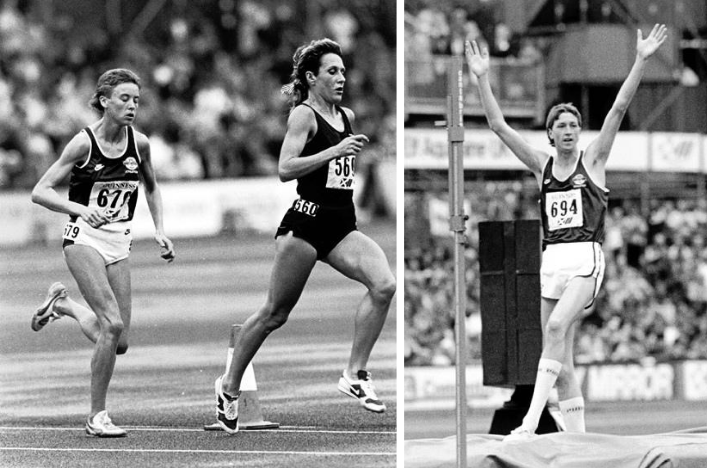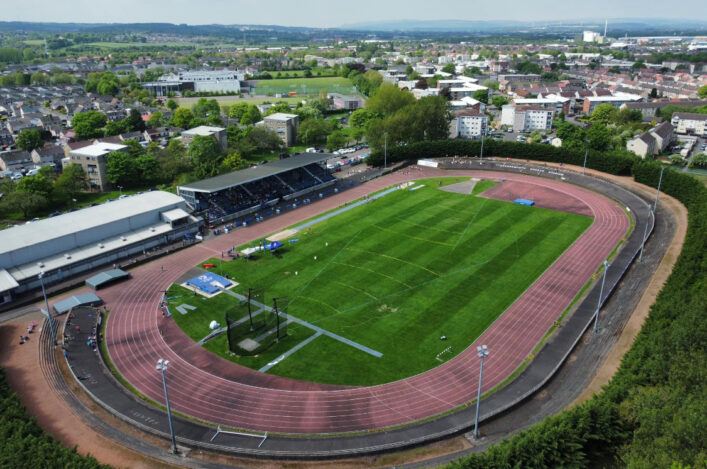Liz triumphs amid off-track drama – Edinburgh, 1986

Photos: Liz Lynch on her way to 10,000m victory over Anne Audain, and Geoff Parsons, who took silver in the high jump – with thanks to John Scott
After the great success of the 1970 Commonwealth Games, Edinburgh put itself forward for a repeat performance in 1986. But if the 1970 Games were the Friendly Games, then 1986 was anything but.
When Edinburgh was selected at the Moscow Olympics of 1980, it was the only city to bid for the Games. Edinburgh had hoped to manage these Games on a budget of £10 million, but the budget was rocketing. Anticipating the increasing cost of the Games, these were the first to allow advertising. There was no financial support from Government so this would be the first private-enterprise spectacular, dependent on market forces.
And market forces spoke. Edinburgh failed to win the backing of big business and there were threats other than financial ones. Apartheid.
On 23 July 1985, Edinburgh hosted the Dairy Crest Games. Zola Budd, the South African given British citizenship in record time, was to run the mile. Edinburgh City Council, taking a hardline stance against apartheid, erected a banner Edinburgh Against Apartheid in Meadowbank Stadium. Channel 4 TV pulled the plug on televising the meeting. The nationwide coverage received hardly helped in making the following year’s Games attractive to sponsors. Within days, Rank Xerox announced it was withdrawing its £300,000 support.
The failed attempts to fund-raise the required amounts led to the emergence of millionaire publisher Robert Maxwell. His accountants highlighted the “chronic mismanagement” and widespread “commercial naivety” on the part of the organisers. Committee chairman and former Edinburgh Lord Provost, Kenneth Borthwick, met with Maxwell on 19 June 1986. Accepting the inevitable, he stepped down as chairman in favour of Maxwell and a rather vague rescue package was sealed with a handshake.
By the time the Games came round, thirty two of the eligible fifty nine countries, largely African, Asian and Caribbean states, stayed away because of the UK government’s policy of keeping Britain’s sporting links with apartheid South Africa in preference to participating in the general sporting boycott of that country. Consequently, Edinburgh 1986 witnessed the lowest turnout since Auckland 1950.
But to the athletics itself … on 23 June 1986, the Commonwealth Games Council awarded 58 places to athletics (33 men and 25 women). There had been late changes to the initial SAAA selection … Graham Williamson failed to meet the qualifying standard required of him and Michael Jemi-Alade, the discus thrower, broke his arm in an arm-wrestling bout. They were replaced by hurdler Glenn MacDonald and javelin thrower John Guthrie. Linsey Macdonald was negotiated into the women’s team by the dropping of an official. There were fitness doubts about others, including Allan Wells and Cameron Sharp, requiring them to be subject to fitness tests.
As it turned out, a 10.45 run in Belfast was not enough to convince the selectors of Wells’ fitness and he did not make the final team. Neither, too, did javelin throwers Diane Royle and John Guthrie, nor sprinter Janis Neilson. Reserve Stewart Maxwell replaced Guthrie as the javelin selection and a team of 56 made the starting line. The 56 included Christine Price in the women’s 10000 metres, the first time the race had been held at the Games. In 1970, as Christine Haskett, she had competed at Edinburgh in the inaugural running of the 1500 metres.
The first day’s athletics did not provide Scotland with the success that boosted the 1970 Games but day two was livelier. Ben Johnson, later to become the disgraced Ben Johnson, won the 100 in a Games record of 10.07 with Elliot Bunney leading Scot in fifth. Sandra Whittaker was fifth in the women’s 100, one place ahead of Kaye Jeffrey but the three medallists were well clear, Heather Oakes winning in 11.20. There was a further fifth place for Brian Whittle in the 400, won by Roger Black, while Debbie Flintoff-King of Australia completed the first part of a 400 double (flat in 51.29 and hurdles the following day in 54.94).
The women’s 3000 metres produced a stirring battle in the absence of Zola Budd, dubiously ruled out of the Games because of disputes over her ‘Englishness’. Yvonne Murray led from half-way to within 50 metres of the finish, before being overtaken by the Canadian duo of Lynn Williams (the Olympic bronze-medallist) and Debbie Bowker. All the while that this was going on, an incredible women’s heptathlon was taking place, England’s Judy Simpson and Australia’s Jane Flemming duelling to the very end with Simpson’s faster 800 giving her victory by a mere four points.
The highlight of day 3 was the victory in the 10000 metres of Liz Lynch (later Liz McColgan) who, looking comfortable throughout, moved clear of New Zealand’s Anne Audain with two laps to go and won by almost 12 seconds in a time, 31:41.42, which beat the Commonwealth record by over 35 seconds.
34 years on, Liz recalls the event with fondness: “So 34 years ago today (28 July) I won my 1st ever championship title at the 1986 Commonwealth Games in Edinburgh. I know a lot of people think the CWG is not important but it was the one race I won that made me realize I could win more championships. It was an important learning experience for me. To be Scotland’s only gold medallist on the track has many fond memories for me, and to be able to share my joy with a stadium full of Scots was the most unreal feeling that I never captured again at a championship .To win and share your joy with others is what made my gold medal so special.”
There was a two-day break before the next athletics events which saw Steve Cram triumph over Tom McKean in the 800 metres. Cram was superb in winning in 1:43.22 with Tom McKean setting a Scottish record of 1:44.80 to take the silver medal. Steve Ovett was another English success, winning the 5000 metres in 13:24.11, a time slower than the 1970 race times of Ian Stewart and Ian McCafferty.
In the field, Milt Ottey and Scotland’s Geoff Parsons had long seen off their rivals in the high jump and Parsons was ahead on countback at 2.26. Both cleared 2.28 on their second attempts but at 2.30 Ottey cleared on his first attempt as Parsons knocked the bar over. Geoff went for it, skipping any further attempt at 2.30 and raising the bar to 2.32, but he was unsuccessful and the Canadian took gold and the Scot silver equalling his British record of 2.28.
On a successful day for the Scottish team, Sandra Whittaker edged England’s Simmone Jacobs to take the bronze medal in the 200 metres, Scotland’s third medal of the day. Anne Purvis had lost out in the 800 though, finishing fourth to Girvan-born Kirsty Wade, representing Wales. And there had been an excellent javelin competition which saw Tessa Sanderson triumph over Fatima Whitbread.
The two marathons took place on the Friday 1 August with John Graham, fourth four years earlier in Brisbane, running almost a minute faster (2:12:10) and still finishing fourth as Rob De Castella (Australia) successfully defended his title in 2:10:15. Fellow Aussie Lisa Martin won the inaugural women’s marathon in a Commonwealth record of 2:26:07.
As the Games reached their finale, Scotland gained another bronze medal in the men’s sprint relay and Steve Cram and Kirsty Wade completed the 800/1500 doubles.
All in all, it had been a good Commonwealth Games, not at 1970 levels, but given the off-track drama, as much as could have been hoped for. The athletics was at an end but the bitterness between Edinburgh City Council and Robert Maxwell was just developing. Legal actions were threatened, insults were traded. The Games had recorded a deficit of £4.3m, and instead of providing the promised funding to save it, Maxwell asked creditors to waive half the payment due to them to keep the event out of liquidation. The debt was finally paid off in 1989, with the city of Edinburgh losing approximately £500,000.

Latest Facebook update
4 hours ago
Photo
Share on Facebook Share on Twitter Share on Linked In Share by Email